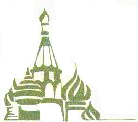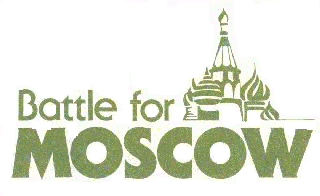Grognard.com: Wargames on the Web


The Wargaming Hobby
by Frank Chadwick; presented by Grognard.com
Wargaming is a hobby that has been growing and expanding for decades. By its very nature,
each game available is very different from every other game, but all can be categorized into
one of three types: board gaming, miniatures gaming, and computer gaming.
The Internet is also a fertile place for wargaming.
- Boardgaming
-
Battle for Moscow is an excellent example of a boardgame. In a nutshell,
board games are played using cardboard counters on a paper map. The rules
for each board game are unique-- the manner in which the counters move on
the map, for instance, might be different from game to game. This is because
the rules are created to best simulate the particular situation involved.
-
Boardgame topics run the gamut of human activity. There are military board
games set in every period of human history: from Ancient times, to Napoleonics,
to present day, to the distant future. There are also games on railroading,
elections, gangsters, and many other subjects. Often different scenarios
allow the use of the same counters and map to play out different situations,
thus turning one boardgame into several. In each scenario victory conditions
are set to determine the winner of the game at its conclusion.
- More information?
-
Apart from Battle of Moscow, other free board wargames are available for you to try out.
-
You can browse the web sites of companies offering board wargames
(and other types of wargame) for sale.
-
Grognard.com contains a large number of reviews
of board wargames (and other types of wargame).
- Miniatures Gaming
-
Gaming with miniature models is the oldest form of wargaming, from which
all other types arose. The idea is to re-create a battle using model soldiers,
tanks, ships, or whatever. The game is played on a tabletop which is created
using model terrain like trees, buildings, hills, or roads.
-
The rules regulate the play of the game. They tell how far the miniatures
can move on the tabletop, how many miniatures constitute a unit and how
to mount them on bases, and how to conduct combat.
-
The chief attraction of miniatures wargaming is its physical appearance.
If you've ever seen a miniatures game in progress, such as a large Napoleonic
engagement where there are literally thousands of miniature figures on the
table, you know how impressive a sight miniatures can be.
-
Miniatures gamers most often double as modelers and painters. Miniatures
rules are available from many sources, but miniature figures are available
from many more. Miniatures manufacturers offer lines which correspond to
periods of history (World War II Naval, American Civil War, Ancient Rome,
etc.). Once the gamer has decided on the particular miniatures he would
like to use, he must purchase them and then paint them using reference materials
on the period as his guide.
-
Miniatures is the most involved type of wargaming. Often many more hours
go into preparation for play than are spent gaming, but that is half the
fun. Should you get a chance to witness such a game, I think you'll agree
that the aesthetic results are well worth it.
- More information?
-
There are free miniatures wargames for you to try out.
-
The Historical Miniatures Gaming Society Historical Miniatures Home Page
is well worth looking at.
- Computer Gaming
-
The newest type of wargaming is a product of our times. Games specifically
set up for computer play take advantage of several never before available
aspects of play.
-
First, computers can be employed to use their incredible computing power
to free the players from enormous lists of continuous calculations. Very
complicated situations can be played out making the computer do the hard
parts and freeing the players to concentrate on strategy and fun.
-
Second, a computer can be used to present more realism than is sometimes
possible with other types of wargaming. One example of this is the computer's
ability to present limited intelligence to the players, allowing them to
know only those things which their troops can see on the battlefield. This
really places the players in the roles of commanding generals, forcing them
to make decisions based only on what they know or can speculate about the enemy.
-
Finally, computers can very often take the role of the second player in
a game, making them ideal for solitaire play. If there are no human opponents
available, or if you simply wish to practice or play the game by yourself,
the computer will operate the opposing side. And if you've ever watched
a computer playing chess you know that it can be a very challenging opponent.
-
A computer version (with source code) of Battle for Moscow is available:-
-
It will help you play Battle for Moscow but it does not contain
a computer opponent. Documentation is available.
- More information?
-
Demos of commercial
and shareware computer wargames are available for you to try out.
-
You can browse the web sites of companies offering computer wargames for sale.
-
The Wargamer - PBEM Computer War and Strategy Gaming contains reviews (and demos) of computer wargames.
- The Internet and Wargaming
-
Like most popular hobbies, wargaming has a thriving community on the Internet.
There are many discussion areas on the Internet for wargaming in general and
certain popular wargames in particular. These discussion areas are a good
place to find out about wargames and pick up the latest hobby news.
-
It is also possible to play most types of wargame via the Internet, using
electronic mail or some other facility. PBEM (Play By Electronic Mail) is
a fast growing facet of wargaming.
- More information?
-
Special software, for example Aide de Camp and the
Wargame Processor, can help in PBEM wargaming. Versions of Battle for Moscow are available for them:-
Grognard.com lists email,
USENET and web
discussion areas for wargaming, as well as a guide to
PBEM wargaming. The Wargamer - PBEM Computer War and Strategy Gaming
contains information on PBEM play of computer wargames.

Back to Battle for Moscow home page

Please report any problems with this page (bfm/hobby.html).

